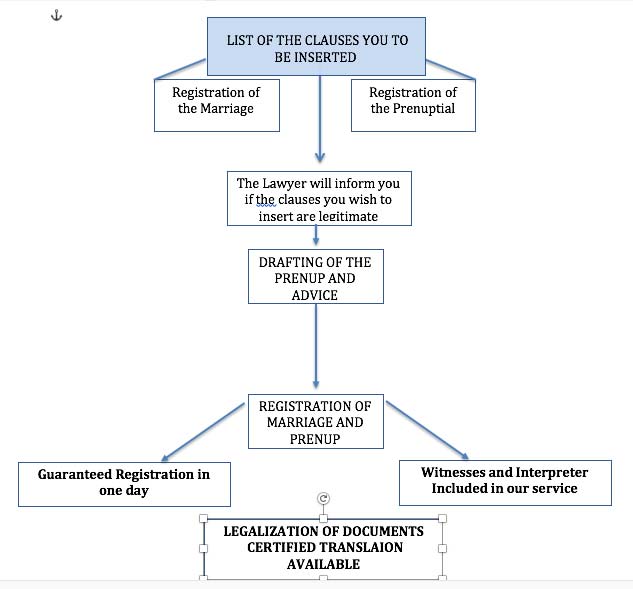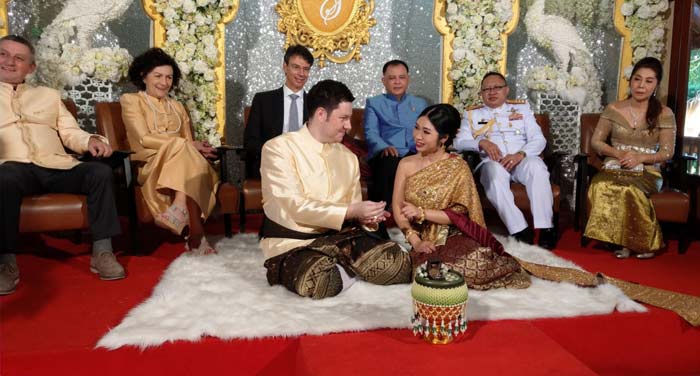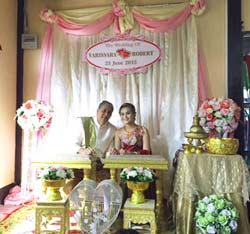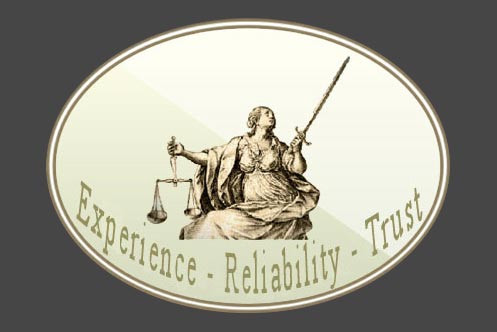PRENUPTIAL THAILAND
MARRIAGE REGISTRATION IN THAILAND
PRENUPTIAL AGREEMENT THAILAND

MARRIAGE IN THAILAND

PRE-NUPTIAL AGREEMENTS
We specialise in both divorce and pre-marriage agreement, also called Marriage-Covenants.
A well done, explicit pre-marriage agreement (See our article clicking the link "divorce") will avoid many future troubles in case of divorce or family litigations. We strongly suggest you consult our lawyers in Pattaya before registering a marriage.
A marriage is, in fact, a special kind of contract which needs special attention.
Our lawyers will be glad to provide any advice and legal consultancy.
Remember that even though, in case of agreement (consensual divorce), divorcing in Thailand can be very easy, on the other side, in case of disagreement it can become a real Odyssey and even be denied.
The Mix-Marriage
Heaven or Hell?
Marriage in Thailand between non-Thai or mix couples (a Thai citizen and a foreigner), it used to be easy to plan and instantly accomplished.
Unfortunately, nowadays, things are a bit more complicated, and the assistance of a specialized legal advisor can significantly facilitate the task. Until a few "months" ago, the registration of a marriage in Thailand could be done at any district office on any working day between 8 am and 3 pm.
Now, most of the districts accept to marry only the residents of the area. If you are unlucky enough as the residents of Pattaya, you can wait months before getting married!
What do I need to marry in Thailand?
Typically you need to produce the following documents.
FOREIGNERS:
A valid passport and visa translated in Thai and certified by your Embassy
Capacity to marry (a proof that you are single) approved by your Embassy
Proof of income
Prenuptial agreement if any*
THAI CITIZENS:
Thai ID
Passport reporting the place of birth, as shown in the birth certificate. It could seem obvious, but it is not.
If the future spouse has changed his'/her name, must show proof of it (copy and original)
Divorce certificate, if divorced (copy and original)
Birth certificate (original only)
Residence book (copy)
Prenuptial agreement if any
Once registered the marriage at a local Ampeu (district) you need to translate the marriage certificate in Thai, legalize it at the Ministry of Foreign Affairs and register it at your Embassy.
VISA.
Usually, the Thai spouse can quickly obtain a long term visa for the country of residence of the spouse.
CHILDREN.
Children born during the marriage will be automatically recognized as the legit children of both spouses while the children born outside the wedding will be recognized as legit children of the mother only.
Read our article "the rights of the foreign stallion."
In such a case the husband, to obtain partial or full custody of a child* must first propose a petition to the Family and Juvenile Court to be first recognized as the legit father of a minor.
COMMON ASSETS.
In the absence of a prenuptial agreement, all assets acquired during the marriage will be equally assigned to both spouses. Be careful: this principal in Thailand is applied even to non-married couples living together for long periods. It is therefore strongly suggested to draw up a proper agreement to regulate a "non-registered consensual union."
ASSETS ACQUIRED BEFORE MARRIAGE.
In theory, all assets acquired before the registration of the marriage shall remain of exclusive property of the owner. However, things are not so simple, and it is always advisable to mention such assets in the prenuptial agreement.
ALIMONY.
The Court will establish the alimony, but you would be surprised how things work differently in Thailand. Even (especially!) for alimony it is highly suggested to mention it in the prenuptial!
RIGHTS OF FOREIGNERS MARRIED TO THAI.
How surprising it can be the rights of a foreign woman married to a Thai man are not similar to the rights of a foreign man married to a Thai woman. Such discrimination, which might seem horrifying to a western mind, it is perfectly legal here.
However, even though the man cannot acquire the same rights and advantages of a woman through marriage, the benefits remain remarkable.
BENEFITS OF MIX MARRIAGE FOR A FOREIGN MALE.
WORK & WORK PERMIT.
The foreigners married to Thai women can help them in a family-managed business without the need to form a company and with only two employees (rather than four).
Should the foreigner married to a Thai apply for a WP Work permit in Thailand* using a company, the company can employ only two Thai employees rather than four and show a social capital of only one million THB.
TAXES & VISA
The foreigner married to a Thai can show a lower income and save big money on taxes.
You can obtain a yearly visa* showing only 400,000 THB (deposited for at least three months) disregarding your age.
You can even live in Thailand, thanks to your wife's income.
COMMON ASSETS SECURITY.
Anything you will purchase after the marriage will be at least 50% yours.
BLACKLIST.
The Immigration might be slightly more condescending and clement non-applying, in some instances and for minor offences, the declaration of "persona non grata" (the notorious blacklist) to foreigners married with children.
TRAVELLING FREEDOM.
Your wife will be allowed to travel with you practically all over the world.
A GOOD CHOICE.
Unfortunately, conditioned by the western mentality, few foreigners fully understand that, in most cases, marrying a Thai, represents a notable advantage with fewer dark sides when compared to western countries.
In particular, if you have the wisdom to register a prenuptial agreement along with your marriage.
Promises and Sighs Dowry and BetrothalThe day that in the world there will be no differences, it will be the end of all. Lao Tse, The Tao The Ching.
As we have often underlined, the most fascinating aspect of living in Thailand consists possibly in the, sometimes, so profound differences between the Thai and the Western cultures. In most of the western countries for instance, in the very recent past, it was custom for the wife to bring a dowry, a sort of gift, a contribution to the future life of the new couple.
In Thailand rather than the Dowry, (money or assets transferred from the bride's family to the groom or to his family), we have the related concept of the bride price. While the bride price is a payment made by the groom or his family to the bride's parents, the dowry is the wealth transferred from the bride's family to the groom or to his family. The price of the bride is not simply a sort of compensation due to the family of the bride for their "loss", but has a far deeper significance: it is an act of respect, a sort of guarantee and, let me say it, even a demonstration of love which extends from the bride to her family.
The price of the bride or better the "Kah Sinsod", is a tradition very often misunderstood by foreigners living in Thailand who confuse a tradition so deeply-rooted in the culture of the Country with a sort of commercialization of the bride, if not an attempt to exploit the foreign groom. Nothing could be further from the truth: first of all, anybody is, still nowadays, obliged to pay the Kah Sin Sood, especially in the rural Thailand; secondly, the price of the bride is not at all a commercialization of the marriage, but is rather an act of appreciation for the bride and of her family. An ancient Thai proverb recites: “a stingy price (of the bride) brings a meager wife”. I have personally met many foreigners married to Thai women proudly bragging to have not paid any price for their wives (a very bad start for a marriage in Thailand!) when, where in their books, a Thai man would feel so humiliated to not having been able to give a "better price". I have also personally met many Thais so desperate to have the sufficient funds for the Kah Sinsod that they really "moved" me!
But...let's see what the law says...
(Section 1437 Civil and Commercial Code) Sinsod is property given by the man to the parents, adopter or guardian of the woman, as the case may be, in return for the woman agreeing to marry. If the marriage does not take place due mainly on the part of the woman or on account of any circumstances that make the woman responsible and make the marriage unsuitable for the man or make the man unable to marry that woman, the man may claim the return of the Sinsod....voila!
But make no mistake, the Kah Sinsod shall not be confused with the Betrothal (promise of marriage) where the extent of the law goes much further. As we can read in article 1438, Betrothal shall not be the cause to request the court to compel the marriage... where... agreement to pay a penalty in case of breach of the betrothal agreement shall be void ...but... (Article 1439) after a betrothal has taken place, if either party commits a breach of the betrothal agreement, the guilty party shall be liable to make compensation. In cases where a woman commits a breach of the betrothal agreement, the betrothal gift shall also be returned to the man.
Compensation may be claimed for the following causes: for injurycaused to the body or reputation of the man or woman; for appropriate expenses or debt incurred in good faith by the betrothed, his or her parents or a person acting in the capacity of his or her parents inpreparation for the marriage; for damages suered by the man orwoman through having take appropriate measures aecting his or herproperty or other aairs relating to his or her occupation or earningsin expectation of the marriage.
Furthermore, please read carefully the sections 1443 and 1444: Incases where there is a significant event that happens to the betrothed woman making the marriage unsuitable for the man, the man shall be entitled to terminate the betrothal agreement and the woman shallreturn the betrothal gift to the man. On the other hand, in cases wherea significant event happens to the betrothed man making the marriage unsuitable for the woman, the woman shall be entitled to terminate the betrothal agreement and the betrothal gift does not need to be returned to the man! Finally, according to Section 1444: If the grounds that makes the one betrothed to renounce the betrothal agreement is gross misconduct committed by the other betrothed, the betrothed who had committed the gross misconduct shall be liable to make compensation to the other party who has exercised his/her right to terminate the betrothal agreement as if he/she has breached the agreement.
Finally.... I can't conclude this article without quoting the answer by a friend of mine who had just married when I asked him how he found the marriage... "You know what? I am so happy that if I would have known before, I would have never been betrothed... I would rather have directly married her!"
How to Marry in Thailand

Clara pacta...amicitia longa!
....Clear agreements make a long friendship
All you need to know before marrying in Thailand
If it is true that the proverbs often contain the quintessence of the popular wisdom matured through centuries of real-life experience, never a motto has been more appropriate as our in case of marriage in Thailand, especially if the spouses come, as often happens here, from distant, different cultures.
In theory in Thailand, registering a marriage or dissolving it can be effortless. In fact, to marry your sweetheart provided that you are single, it will be enough to show proof of celibacy and a few more routine documents. Similarly, in case of complete agreement, to divorce is even easier, even if the marriage has produced offspring. If the spouses are in full agreement, it suffices to go back to the municipality and subscribe a document of divorce in front of two witnesses. Et...voilà...! Les jeux sont fait! ...but ...really? Is it so easy? How many people do you know who, after years of marriage, actually divorce without any conflicts, demands or contrasts?
As we all know, marriage is a private contract though partly regulated by law. In most western countries, at the moment of the subscription of the contract, we find ourself in front of a choice: choose the "regime" of community or the one of separation of property.
In the first case, all goods that you will buy before the marriage will remain yours, in the second case, all assets purchased after the wedding will be common property. In Thailand the spouses, at the moment of the registration of the marriage can, in the same way, register an agreement choosing the "sin som rot" (community) or "sin suan tua" (separation) with the difference that such a choice is much more extensive than in the West, and it can go much further than a simple option of community or separation of property. Provided that such a pact respects the law, it can be enforced by a court in case one of the spouses should fail to respect it, and it will make a solid ground to avoid future conflicts.
Even though globalization is quickly flattening differences and sadly canceling many of the local traditions that used to make the world so various, in Thailand the "Kah Sin Sot," a dowry "upside down," is still deeply-rooted and respected. The groom must pay a dowry to the family of the bride and, even though such a habit doesn't officially entail legal consequences, it still has a significant influence on the "way of seeing" the marriage in its full significance.
In a Thai marriage, the "Kah Sin Sot" can not be included in the "Sin Som Rot" (the common goods) and belongs to the parents of the bride. On the contrary, the spouses can derogate to the regime of "common property" partly or totally, for example indicating one or more particular property that one of the spouses intends to buy or specifying that anything purchased after the marriage will remain of exclusive property of the purchaser. But the possibilities offered by the pre-marital agreements are not limited to material goods, they can also foresee many other aspects of future separation, including the custody of children.
Unfortunately, the majority of foreigners marrying Thai nationals, so used to the western strict limits and rules, ignore the broad discretion admitted by the Thai legal system and rarely subscribe and register an adequately set up, explicit pre-marital covenant which in most cases would avoid never-ending conflicts, litigations, and stress.
Remember, without a pre-marital agreement all the assets acquired after the marriage will be the common property of the spouses in the measure of 50% each (including your brand new beloved car, bike or boat!!) with very few exemptions as donations, gifts, and strictly personal goods. The spouse can't consequently dispose of more than 50% of the joint assets by last will so think well and remember....Clear agreements make for long.
Prenup - Prenutial agreement Thailand. We can assist you whererever you are in Thailand including:
Thailand Prenutial Agreement - Bangkok Prenuptial Attorney (กรุงเทพมหานคร), Chonburi (ชลบุรี), Pattaya (พัทยา) Rayong Rayong (ระยอง), Lawyer Trat (ตราด), Krabi (กระบี่), Nakhon Si Thammarat (นครศรีธรรมราช), Phang Nga (พังงา), Ranong (ระนอง), Songkhla (สงขลา), Surat Thani (สุราษฎร์ธานี) Lawyer Koh Samui (เกาะสมุย), Prenuptial lawyer Chiang Rai (เชียงราย), Lampang (ลำปาง), Mae Hong Son (แม่ฮ่องสอน), Kanchanaburi (กาญจนบุรี), Nonthaburi (นนทบุรี), Phetchaburi (เพชรบุรี), Buri Ram (บุรีรัมย์), Chaiyaphum (ชัยภูมิ), Khon Kaen (ขอนแก่น), Mukdahan (มุกดาหาร), Nakhon Phanom (ระยอง) Phuket (ภูเก็ต), Chieng Mai (เชียงใหม่), Phitsanulok (พิษณุโลก), Sukhothai (สุโขทัย), Samut Prakan (สมุทรปราการ), Samut Songkhram (สมุทรสงคราม), Saraburi (สระบุรี), Suphan Buri (สุพรรณบุรี), Chachoengsao (ฉะเชิงเทรา), Chanthaburi (จันทบุรี), Prachin Buri (ปราจีนบุรี), (นครพนม), Nakhon Ratchasima (นครราชสีมา), Nong Khai (หนองคาย), Sakon Nakhon (สกลนคร), Surin (สุรินทร์), Ubon Ratchathani (อุบลราชธานี), Udon Thani (อุดรธานี), Ayutthaya (พระนครศรีอยุธยา), Lop Buri (ลพบุรี), Nakhon Nayok (นครนายก), Nakhon Pathom (นครปฐม), Nakhon Sawan (นครสวรรค์),



